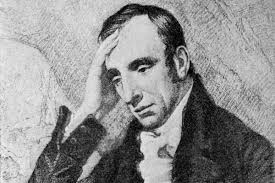Wordsworth Lied
Wordsworth1 lied
That poetry is emotion recollected
In tranquility
When words drop from my pen
Like arrows from the quiver
Does it matter how they fall on paper
It is the pain they paint
That creates the emotion for poetry.
I wrote a poem I cannot edit
There is no anagram2 for pain
No recollection reduces pain
No tranquility reduces pain.
Poetry is a recurrent emotion
That shatters tranquility
Like the bewildering death
Of an innocent child.
From The Palm of Time (Lagos: Malthouse Press Ltd, 2002, p.56)
- William Wordsworth (1770-1850) one of the great Romantic poets; while Romanticism is a term used to describe the philosophical and literary movement dating from 1789, the French Revolution, to about 1830. It upheld the central importance of the imagination, the individual and nature as a source of moral knowledge.
- Literally, a phrase or word made simply by changing the ordering of the letters of another phrase or word, for example, “Listen” can be changed to “Silent”. But here it is used to denote substitution or an alternative.
A lyrical, metapoem (or a poem about the art of poetry) that seeks to repudiate the famous, commonplace definition of poetry given by William Wordsworth. It tries to give a “new” definition, which like the one it attempts to deny relies too on emotion.
A consummate stylist and an accomplished poet, Dr Abubakar Othman is a Senior Lecturer in the Department of English of the University of Maiduguri, Borno State. He is currently on a leave of absence at his native Adamawa State where he is a commissioner. In addition to numerous academic articles in journals and chapters in books, Dr Othman has been publishing his poetry in different outlets for quite a long time. His poetry is collected in The Palm of Time (2002) from which “Wordsworth Lied” is excerpted. This debut collection is easily the most accomplished to come out in recent time from Northern Nigeria.
Spoken in the voice of the poet, Wordsworth Lied is an ambitious poem that also assumes too much, not only as it attempts to give a new definition of poetry and what it entails, but as it introduces the reader into a commonplace definition of poetry given by William Wordsworth. In his famous Preface to the Lyrical Ballads, Wordsworth repeatedly but polemically stated that ‘good’ poetry is the “spontaneous overflow of powerful feelings” which is recollected in tranquility. Accordingly, poetry is not simply a mirror of people in action; rather its essence is the poet’s own feelings. The buzzword here is “imagination”. Since this definition is well known, Dr Othman deems it fit to start with a repetition of the title of his poem Wordsworth Lied and goes on to supply the said definition word for word without any indication that the two lines preceding the first are actually Wordsworth’s words quoted verbatim (now in the public domain by virtue of their popularity or notoriety).
The second stanza describes the actual process of poetic composition from the point of view of the poet. This constitutes the beginning of his repudiation (or subversion) of Wordsworth’s poetic manifesto, (and technically the actual beginning of Dr Othman’s poem). And in this regard the word “drop” is important. It sharply contrasts with Wordsworthian calmness: the art of poetic composition is supposedly violent, with words literally dropping from pen “like arrows from the quiver”. The apt simile completes the contrast; while a rhetorical question heightens the repudiation: since poetry is never a tranquil process, it does not matter how the process takes place. The concluding lines provide a sort of prologue to a definition: it is the (painful) experience poetry vividly and linguistically captures that is the emotion inherent in it, and not how the experience is recollected.
The third stanza is a revelation from the poet: the realisation that pain (whether experienced or imagined) cannot just be substituted in the name of poetry. The fact that Dr Othman cannot edit (or rather ‘excise’) bad memories from one of his poems, and by extension his entire poetic oeuvre means pain would always remain a painful thing to deal with in poetry and ironically central to it: there would be no anagram, no substitution or an alternative. The last two lines of the stanza are powerful affirmation of the poet’s firm belief in the painful but necessary nature of poetic composition. Each of the lines start with the word “no” followed by clever use of words (“recollection”, “tranquility”) borrowed from Wordsworth’s definition, but serving a different purpose here.
The definition that Dr Othman hinted at the beginning is given at the last stanza. As such the preceding stanzas are merely preambles to a definition. The definition, when it comes is the stark opposite to that of Wordsworth as expected: Dr Othman sees poetry as a series of repeated emotions that disturbs one’s tranquility. Even though the word that is used in the previous stanza to suggest this is conspicuously missing, the word “pain” is subtly but powerfully hinted at through another concise simile, “like the bewildering death of an innocent child”—a reference to the death of the poet’s daughter which is the subject matter of another beautiful poem, “I am Now Strong Enough”.
In the end, Dr Othman’s definition turns out to be a very personal one, just as the art of poetry is: the death of his daughter, a painful, recurrent emotion, is what poetry is all about; and it is what would generally inform his poetry just as happy memories informed and entailed the Wordsworthian definition.
Therefore, Wordsworth lying is ironically Othman’s crying. Wordsworth Lied is a poem that is composed to ignite compassion and excite benevolence to the kind of experience that we daily encounter. I guess the ‘subversive’ definition outlined is not a difficult one to grasp as it removes the mystique of the imagination and emotion in poetry which Wordsworth’s definition endowed (or is it stained?) it with.
William Wordsworth (1770-1850) one of the great Romantic poets; while Romanticism is a term used to describe the philosophical and literary movement dating from 1789, the French Revolution, to about 1830. It upheld the central importance of the imagination, the individual and nature as a source of moral knowledge.
Literally, a phrase or word made simply by changing the ordering of the letters of another phrase or word, for example, “Listen” can be changed to “Silent”. But here it is used to denote substitution or an alternative.

Department of English and Literary Studies
Bayero University, Kano
ibala.eng@buk.edu.ng
08065380091
- Poets Talk: 5 Questions with Chika Jones - April 9, 2018
- Poets Talk: 5 Questions with Nyachiro Lydia Kasese - February 28, 2018
- Heart of Poetry: Tsenongu Moses Terhemba’s On His Neglect of Prose by Ismail Bala - February 6, 2018












beautifull poem,,,,
why not try to make a song ???
I must say the analysis of the poem is masterly done and have dissected bare the the hidden meaning of the poem.